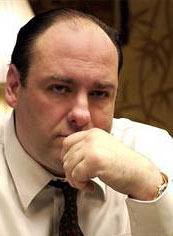 There’s an old psychiatrists’ joke that goes: “If you’re a jerk, and you go talk to a psychiatrist about being a jerk, afterwards you’ll still be a jerk. But you’ll feel good about it.” The same might be said for Tony Soprano.
There’s an old psychiatrists’ joke that goes: “If you’re a jerk, and you go talk to a psychiatrist about being a jerk, afterwards you’ll still be a jerk. But you’ll feel good about it.” The same might be said for Tony Soprano.
With only two episodes to go, the leitmotif of mental health emerged as a central character, the raison d’etre of the Soprano clan. Every member of the immediate family has sought psychiatric care: Tony, Carmela, Meadow; Uncle Junior is in a mental hospital for the criminally insane; and A.J. is the latest victim of the Soprano “curse,” as Carmela calls it.
Disillusioned by the world and disturbed in particular by his class on Israeli-Palestinian relations, A.J. attempts to kill himself in the family pool, only to realize at the last moment that he doesn’t want to die. In one of the most discomfiting moments on television, A.J. struggles against the line tethering him to the concrete block at the bottom of the pool and manages to push the suffocating Ziploc baggy and rubber band up above his nose and mouth, gasping for air. Tony returns home and fishes A.J. out of the water only to initially chastise him–and then hold the weeping boy in his arms.
Upon talking to Dr. Malfi about A.J.’s suicide attempt, Tony asks the eternal question “Why me?” He goes on to explain that he thinks he is a good man. Indeed, for all of his faults, Tony fiercely loves his family, or at least the idea of family, and usually tries to do right by his larger mafia family. But Tony is not a regular family guy–nor are his cohorts, who console Tony by sharing stories of their anorexic daughters and depressed sons, explaining that “kids are under a lot of pressure these days.”
And Anthony, Jr. more so. Though his insta-nihilism didn’t seem absolutely sincere, it’s worth considering that A.J. has never had a “You’re in the Mafia, Dad” moment like Meadow. He’s never voiced the discomfort with the family business that seems to color everything and uses his comments about things like fecal matter in meat to repudiate and criticize his parents, since he’s afraid to confront them about Tony’s criminal life.
Meanwhile, in an odd aside, Dr. Elliott Kupferberg tells Dr. Malfi that a recent study has shown that talk therapy doesn’t help sociopaths become upstanding citizens, but in fact aids them in their criminality. While not a classic sociopath, Tony has been able to use the insights provided by therapy against others–helping manipulate them and justifying his own actions. Psychiatry has been a part of “The Sopranos” since the pilot episode, and it seems that it is to writer/producer David Chase what religious references are to Scorsese or Coppola–a way to bring out the secretive characters’ inner lives.
We sympathize with Tony because of his therapy; we sympathize with him because we see things most often from his perspective. We know all about his family, and we perceive the genuineness of his emotions about his wife and children and, occasionally, his desire to create something slightly better than a brutal, ugly existence for them. If we saw as little of Tony’s inner life as we see of Phil Leotardo’s or some of the other cruel and violent criminals in the series, then we’d find it difficult to have any feeling for him.
But as it is, we still believe that deep, deep down, Tony really could be a good man.


